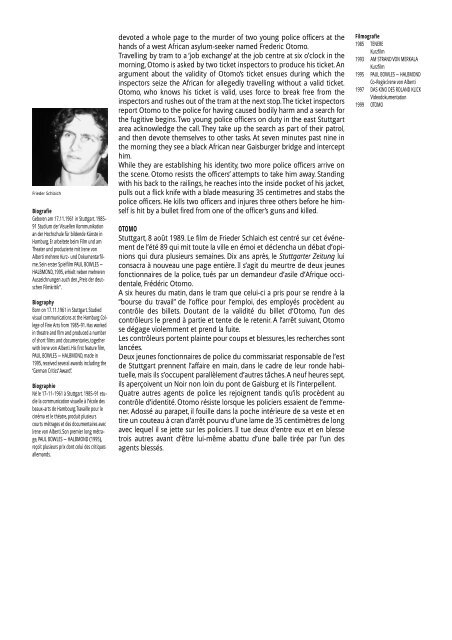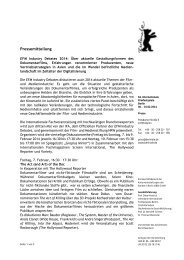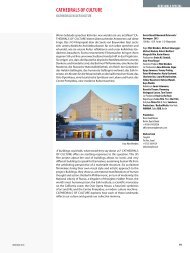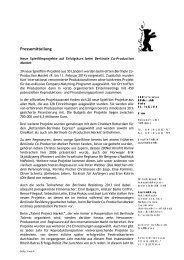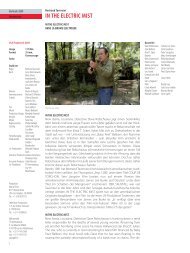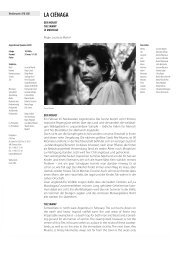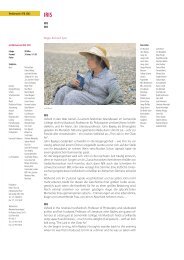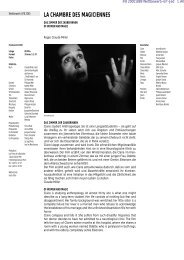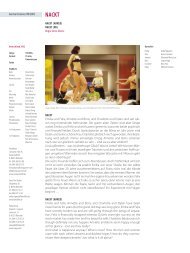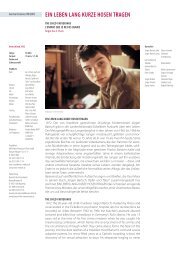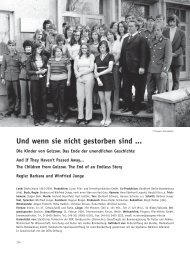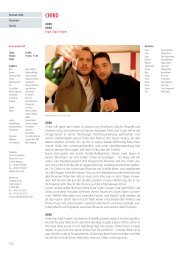OTOMO Stuttgart, 8. August 1989: Im Zentrum von Frieder ... - Berlinale
OTOMO Stuttgart, 8. August 1989: Im Zentrum von Frieder ... - Berlinale
OTOMO Stuttgart, 8. August 1989: Im Zentrum von Frieder ... - Berlinale
Erfolgreiche ePaper selbst erstellen
Machen Sie aus Ihren PDF Publikationen ein blätterbares Flipbook mit unserer einzigartigen Google optimierten e-Paper Software.
<strong>Frieder</strong> Schlaich<br />
Biografie<br />
Geboren am 17.11.1961 in <strong>Stuttgart</strong>. 1985-<br />
91 Studium der Visuellen Kommunikation<br />
an der Hochschule für bildende Künste in<br />
Hamburg. Er arbeitete beim Film und am<br />
Theater und produzierte mit Irene <strong>von</strong><br />
Alberti mehrere Kurz- und Dokumentarfilme.<br />
Sein erster Spielfilm PAUL BOWLES –<br />
HALBMOND, 1995, erhielt neben mehreren<br />
Auszeichnungen auch den „Preis der deutschen<br />
Filmkritik“.<br />
Biography<br />
Born on 17.11.1961 in <strong>Stuttgart</strong>. Studied<br />
visual communications at the Hamburg College<br />
of Fine Arts from 1985-91. Has worked<br />
in theatre and film and produced a number<br />
of short films and documentaries, together<br />
with Irene <strong>von</strong> Alberti. His first feature film,<br />
PAUL BOWLES – HALBMOND, made in<br />
1995, received several awards including the<br />
‘German Critics’ Award’.<br />
Biographie<br />
Né le 17-11-1961 à <strong>Stuttgart</strong>. 1985-91 etudie<br />
la communication visuelle à l’école des<br />
beaux-arts de Hambourg.Travaille pour le<br />
cinéma et le théatre, produit plusieurs<br />
courts métrages et des documentaires avec<br />
Irene <strong>von</strong> Alberti. Son premier long métrage,<br />
PAUL BOWLES – HALBMOND (1995),<br />
reçoit plusieurs prix dont celui des critiques<br />
allemands.<br />
devoted a whole page to the murder of two young police officers at the<br />
hands of a west African asylum-seeker named Frederic Otomo.<br />
Travelling by tram to a ‘job exchange’ at the job centre at six o’clock in the<br />
morning, Otomo is asked by two ticket inspectors to produce his ticket. An<br />
argument about the validity of Otomo’s ticket ensues during which the<br />
inspectors seize the African for allegedly travelling without a valid ticket.<br />
Otomo, who knows his ticket is valid, uses force to break free from the<br />
inspectors and rushes out of the tram at the next stop.The ticket inspectors<br />
report Otomo to the police for having caused bodily harm and a search for<br />
the fugitive begins. Two young police officers on duty in the east <strong>Stuttgart</strong><br />
area acknowledge the call. They take up the search as part of their patrol,<br />
and then devote themselves to other tasks. At seven minutes past nine in<br />
the morning they see a black African near Gaisburger bridge and intercept<br />
him.<br />
While they are establishing his identity, two more police officers arrive on<br />
the scene. Otomo resists the officers’ attempts to take him away. Standing<br />
with his back to the railings, he reaches into the inside pocket of his jacket,<br />
pulls out a flick knife with a blade measuring 35 centimetres and stabs the<br />
police officers. He kills two officers and injures three others before he himself<br />
is hit by a bullet fired from one of the officer’s guns and killed.<br />
<strong>OTOMO</strong><br />
<strong>Stuttgart</strong>, 8 août <strong>1989</strong>. Le film de <strong>Frieder</strong> Schlaich est centré sur cet événement<br />
de l’été 89 qui mit toute la ville en émoi et déclencha un débat d’opinions<br />
qui dura plusieurs semaines. Dix ans après, le <strong>Stuttgart</strong>er Zeitung lui<br />
consacra à nouveau une page entière. Il s’agit du meurtre de deux jeunes<br />
fonctionnaires de la police, tués par un demandeur d’asile d’Afrique occidentale,<br />
Frédéric Otomo.<br />
A six heures du matin, dans le tram que celui-ci a pris pour se rendre à la<br />
“bourse du travail” de l’office pour l’emploi, des employés procèdent au<br />
contrôle des billets. Doutant de la validité du billet d’Otomo, l’un des<br />
contrôleurs le prend à partie et tente de le retenir. A l’arrêt suivant, Otomo<br />
se dégage violemment et prend la fuite.<br />
Les contrôleurs portent plainte pour coups et blessures, les recherches sont<br />
lancées.<br />
Deux jeunes fonctionnaires de police du commissariat responsable de l’est<br />
de <strong>Stuttgart</strong> prennent l’affaire en main, dans le cadre de leur ronde habituelle,<br />
mais ils s’occupent parallèlement d’autres tâches. A neuf heures sept,<br />
ils aperçoivent un Noir non loin du pont de Gaisburg et ils l’interpellent.<br />
Quatre autres agents de police les rejoignent tandis qu’ils procèdent au<br />
contrôle d’identité. Otomo résiste lorsque les policiers essaient de l’emmener.<br />
Adossé au parapet, il fouille dans la poche intérieure de sa veste et en<br />
tire un couteau à cran d’arrêt pourvu d’une lame de 35 centimètres de long<br />
avec lequel il se jette sur les policiers. Il tue deux d’entre eux et en blesse<br />
trois autres avant d’être lui-même abattu d’une balle tirée par l’un des<br />
agents blessés.<br />
Filmografie<br />
1985 TENERE<br />
Kurzfilm<br />
1993 AM STRAND VON MERKALA<br />
Kurzfilm<br />
1995 PAUL BOWLES – HALBMOND<br />
Co-Regie: Irene <strong>von</strong> Alberti<br />
1997 DAS KINO DES ROLAND KLICK<br />
Videodokumentation<br />
1999 <strong>OTOMO</strong>


